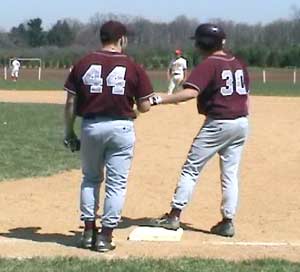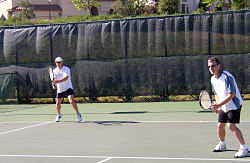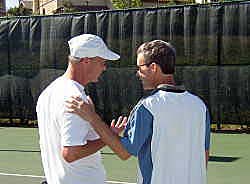
Play Better Doubles: Be Your Own Coach
by Kevin Pope
|

The coach’s job is to focus the
player's attention on the game situation, and to the possible
scenarios that might come into play |
A couple of weeks ago I was at a San Francisco Giants game
sitting along the first base line and happened to notice an exchange
between the first base coach and a batter (now a baserunner).
It was the
13th inning. The batter, Rich Aurilia, had reached first base safely on a
walk. Between pitches, the first base coach, put his arm around the
players shoulder and had a few words with the baserunner before the
pitcher began to return to the mound and continue the normal progress of
the game.
Earlier in the game, one of the Giants players had
committed one of the more comedic and ridiculous baserunning mistakes of
the season.
While I could not be privy to exactly what was said, I
will assume that unlike Bull Durham, they weren’t talking about candle
sticks as a wedding gift or needing a dead rooster to exorcise the demons
from a bat.
The likely exchange would be more like this: After an
initial positive affirmation for reaching first base, the coach’s job then
was to shift the player’s attention away from the batting phase (the past)
to the new task at hand.
|
|
Surely he didn’t want a replay of the earlier baserunning gaff. A quick recap of the game situation, i.e. score, outs,
other baserunners, then probably a checklist
of possible scenarios on the next pitch, and what the baserunner should do
should each of them happen. He probably reminded the runner to perform one
of more of the following:
- Advance on a ground ball
- Go half way on a fly
- Freeze on a line drive
- On a base hit pick up the third base coach for a
decision on how many bases to advance.
So what is my point here on TennisONE of giving you the
intricacies of first base coaching? No, I have not lost my way from the BaseballONE coaching site.
The point being, the first base coach's role,
in prompting and providing the runner with checklists, prompts and plans,
is the same role we need to fill for ourselves to be good doubles players.
One of the things I have always liked most about tennis, (a bit ironic in
light of the fact that I am a coach), is that in most tennis competitions,
there is no on court coaching. I like that it leaves the player or players
in this dual role of both coach and player.
|

Just before your partner receives serve,
run through a few quick scenarios and possible responses in each one. |
The concept of the coach prompting the base runner with
possible scenarios is exactly like a doubles match in tennis. This is
particularly similar to the situation where my partner is receiving serve
and I am preparing for possible scenarios based on his return.
Following the point where I have received serve, I make a
quick evaluation of the past point. I affirm something we (or I) might
have done well or make a quick resolve to fix something we did wrong. This
mental analysis and commitment to action could improve our play in case a
similar point emerges later in the match.
Now I am ready for the first base coach in me to take
over. I begin to focus myself on the situation at hand and not on the
past. As I step to the service line and my partner prepares to return
serve, I run through a few quick scenarios, and what my response is going
to be in each one.
- Scenario 1: Partner floats a weak return that the net
person will surely intercept. My response, cover the middle,
try to get a racquet on it and make something happen. Holding my ground
in terms of depth on the court.
- Scenario 2: Great return at incoming server’s feet. My
response, close the net quickly, and look for a floating ball to poach on.
- Scenario 3: Partner successfully lobs net person forcing
server to go back and play the next ball. My response, close the net and look for
possible lob or poachable ball.
|

Communication between partners is crucial to winning doubles. |
While it is impossible to prepare or review all
scenarios, and nor would we want to, certain scenarios based on patterns
in the match and knowledge of our partner and opponents, make it very
possible to visualize a few of the more likely ones.
For example, if my partner relies on a big forehand, then
I can anticipate his return on a serve to that side. On the other hand, if
my partner tends to throw up a lob on hard serves to his backhand, I can
anticipate that also. It is this preparation in between points that helps
eliminate the hesitancy or indecision and creates much more aggressive and
ultimately more successful play.
The role I play as “first base coach” can be
all-encompassing just like that of a baseball first base coach. Like a first
base coach in baseball who analyzes an outfielder's arm, and knows the
parameters of what he is capable of doing, in tennis, my job as “first
base coach” also includes such analysis. Is my opponent capable of hitting
a lob off his backhand, or can I pretty much expect him to drive the ball
every time?
This role, just as the baseball coach's role, includes,
being animated, positive, encouraging aggressive play and risk taking,
etc. So while the role of “first base coach” takes on many facets, perhaps
the most important one it takes on is the one that readies the player for
each and every point both mentally and physically.
Since tennis does not allow coaching, this role as “first
base coach” can not only apply to coaching yourself, but can also be
applied in relation to your partner in doubles." Like a baseball coach communicating
with his players, our communication with our partner becomes crucial in
the following areas:
|

Encourage your partner and help him maintain a positive attitude. |
- Identifying, discussing and formulating a plan to attacking
opponents' weaknesses
- Pointing out perceived tendencies of our opponents
- Communicating during points themselves thus
improving court coverage
- Communicating during points if you
perceive that a ball will be out
- Talking with your partner to maintain a positive attitude and stay
focused on the next task at hand
- Communicating to your partner either verbally or with
signals, as to plans on the following shot.
The parallels are endless in terms of the roles shared
between a first base coach and the tennis player. In a sport that gives us
the challenge of assuming the role both of coach and player, how well
we're able to execute these dual roles will often determine whether we win
or lose.
So what happened to Rich Aurillia on first base in the
bottom of the 13th. Well, the Giants won that game.
|